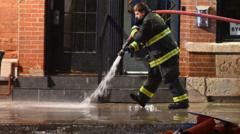A recent probe uncovered a troubling channel through which weapons from U.S. manufacturers are trafficked to Haiti, exacerbating the country's escalating gang violence. Despite tightened regulations, a lack of inspections and accountability continues to facilitate this crisis.
U.S.-Origin Firearms Fuel Gang Violence in Haiti: An Alarming Trafficking Network Exposed

U.S.-Origin Firearms Fuel Gang Violence in Haiti: An Alarming Trafficking Network Exposed
An investigation reveals how U.S. firearms are smuggled to gang-controlled Haiti, highlighting weaknesses in regulation and enforcement.
The journey of illicit firearms from the United States to gang-ravaged Haiti paints a grim picture of a thriving trafficking network that is worsening the nation’s violence. An investigation by the BBC World Service and BBC Verify has unveiled how firearms, including rifles and pistols, are making their way into the hands of gangs, fueling chaos in the Caribbean island nation.
The disturbing discovery began with the seizure of two boxes containing 12 assault rifles, 14 handguns, and nearly 1,000 rounds of ammunition by Haitian police in April 2024. According to reports, these boxes were destined for Cap-Haitien and had come from Fort Lauderdale, Florida, traversing a distance of nearly 1,200 kilometers (746 miles) on a cargo ship named Rainer D. The shipment was disguised as humanitarian aid, mixed in with food and clothing, raising questions about lax oversight within U.S. gun laws.
Experts have labeled the U.S. a “supermarket” for arms, essentially providing a continuous supply to criminal organizations exploiting vulnerabilities in both legal and enforcement frameworks. With many firearms originating from states like Florida, where private sellers can previously sell guns without background checks, traffickers are known to utilize “straw buyers” to acquire weapons without raising suspicion.
The company responsible for shipping the cargo, Alliance International Shipping, acknowledged the challenges of preventing illegal shipments, emphasizing that its hands are tied when it comes to monitoring the contents of containers. The company does not own vessels but rather purchases cargo space to sell to clients, complicating the logistics of enforcing regulations.
According to the United Nations, the U.S. has increased its shipping inspections, but a significant majority of containers, estimated at 200 weekly from South Florida to Haiti, remain unchecked. This lack of scrutiny enables arms traffickers to take advantage of a system that is already overwhelmed by the sheer volume of outgoing shipments.
Upon arrival in Haiti, police conducted a targeted search of the container, uncovering the weapons thanks to intelligence about local smugglers allegedly connected to gang activities. A customs official implicated in the scheme was arrested, underscoring the rampant corruption and inefficiency plaguing Haiti's government agencies.
The situation reached unprecedented levels when gang violence escalated in Port-au-Prince, resulting in mass unrest and chaos. Reports indicate that gangs executed prison breaks and blocked critical infrastructure, contributing to a staggering death toll surpassing 5,600 in 2024 alone. With continued violence driving nearly a million people from their homes, the impact of trafficking on civilian safety cannot be understated.
Experts argue that while international scrutiny into the escalating crisis has increased, tangible action remains elusive. Calls for reform in U.S. gun legislation face significant political hurdles, raising concerns about the ongoing flow of arms into Haiti and similar conflicts globally.
Furthermore, advocates for change believe that implementing a stricter regulatory framework, including a more robust tracking system for gun sales, is vital to combating this troubling trend. As of now, the situation illustrates a grim reality where regulation and enforcement lag far behind the capabilities of organized crime, leaving vulnerable populations in peril.




















